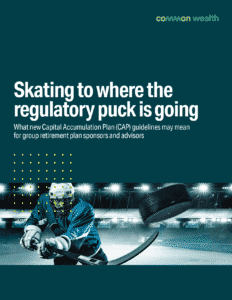The group retirement landscape is on the brink of significant changes with the upcoming revisions to the Capital Accumulation Plan (CAP) Guidelines. These guidelines are the cornerstone of how group retirement plans are structured, administered and regulated in Canada. While discussions are ongoing, this is an invaluable opportunity for advisors and plan sponsors to prepare for the future of retirement security.
Key themes of the reforms

-
-
- A greater focus on ensuring adequate retirement income
- Enhanced member engagement to foster informed decision-making
- A simplification of choices to offer streamlined investment lineups
- Reinforcement of the duty of care that plan sponsors owe to their members
- Ensuring plans offer value for money for plan members
- Increased support for decumulation, the post-retirement phase of planning
-
While there are some differences between the FSRA – OSFI recommendations and the latest version of the draft CAP Guidelines, these themes still provide a reasonable summary of the direction of regulatory change.
It’s essential for all stakeholders to stay informed and proactive during this period of transition. Here’s how you can engage:
Getting ahead of the regulatory curve
-
- Keep abreast of the regulatory updates as part of renewals and/or plan reviews. It is important to ensure that your group retirement plan remains compliant with regulations and consistent with industry best practices.
- Adapt governance review frameworks to incorporate the themes laid out above, helping to understand how your plan is performing when it comes to retirement income, member engagement, fees, and decumulation.
- Review the approach to benchmarking, as plan performance is reviewed and benchmarked against other options available on the market. Consider the regulatory changes when revising benchmarking criteria.
Supporting your journey
Common Wealth has developed tools, frameworks, and techniques to help guide you through the changes in the regulatory environment, as well as in the group retirement market more broadly. Whether you are an advisor or an employer looking to offer competitive retirement benefits, understanding these reforms is crucial. If you have any questions, feel free to reach out to our team.
Let’s embrace these changes and work towards a secure and prosperous retirement future for all Canadian workers.
– – –
Additional insights: CAP Guidelines timeline
For those looking to delve deeper, the following timeline offers a comprehensive view of the regulatory journey – from the establishment of the CAP Guidelines in 2004 to the latest rounds of feedback and proposed revisions in 2023.
-
- 2004: The original CAP Guidelines are released, the result of a collaboration between pension, securities, and insurance regulators from across the country.
- November 2021: OSFI and FSRAO release recommendations to the Canadian Association of Pension Supervisory Authorities (CAPSA) for the revision of the CAP Guidelines. To help employers and advisors understand the proposed changes, Common Wealth created an e-book to summarize the recommendations and hosted a webinar with FSRAO representatives.
- May 2022: CAPSA releases proposed revisions to CAP Guideline No. 3 for consultation. These guidelines were drafted by the CAPSA CAP Committee, which includes representatives from pension regulators, insurance regulators, and securities regulators.
- May-August 2022: 12 industry organizations submitted comments to CAPSA on the first draft of the revised Guidelines. Comments can be found here.
- May 2023: CAPSA releases a second revision of the proposed revisions to CAP Guideline No. 3, updated based on stakeholder feedback, with the consultation period open until July 2023.
- August 2023: Three industry groups – the Association of Canadian Pension Management, the Canadian Life and Health Insurance Association, and the Pension Investment Association of Canada – release a joint letter expressing concern about the proposed guidelines and calling on CAPSA to recall the industry working group for a further review of the proposed guidelines.



